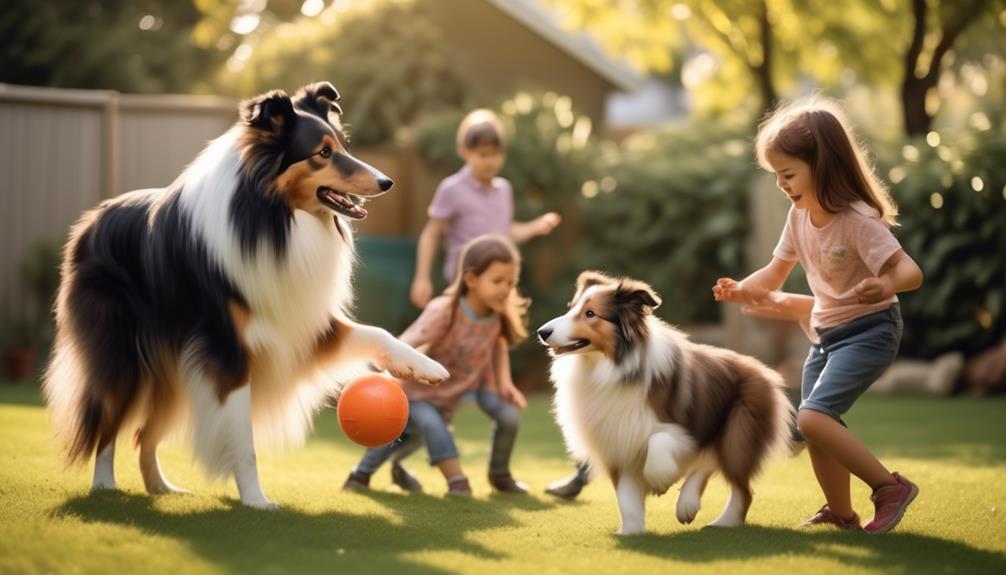12 Top Family-Friendly Dog Breeds: A Guide
Looking for the perfect four-legged addition to your family? Wondering which dog breeds are best suited for your household dynamic?
Whether you have young children, teenagers, or are simply looking for a loyal companion, the right dog breed can make all the difference. But with so many options out there, how do you know which one is the best fit for your family?
Well, get ready to discover the top 12 family-friendly dog breeds that could be the perfect match for you. Each breed comes with its unique traits and characteristics, and finding the right one is essential for a harmonious family-dog relationship.
Labrador Retriever
The Labrador Retriever is a versatile, affectionate companion known for its friendly demeanor and intelligence.
When it comes to training techniques, consistency is key. Labradors respond well to positive reinforcement, so be sure to use plenty of treats, praise, and rewards during training sessions. Keep training sessions short and engaging to maintain their interest and focus.
Health care tips for your Labrador Retriever include regular exercise to keep them at a healthy weight and prevent joint issues, as they're prone to obesity. Additionally, be mindful of their diet, as Labradors love to eat and can easily overindulge if given the chance. Regular veterinary check-ups are important to monitor their overall health and to catch any potential issues early on. Grooming is relatively low-maintenance, but regular brushing and occasional baths will help keep their coat in good condition. It's important to keep an eye on their ears and nails as well.
Ensuring that your Labrador receives proper socialization from a young age will help them grow into a well-adjusted and friendly adult dog. With the right training and care, your Labrador Retriever will be a loving and loyal member of your family for years to come.
Golden Retriever
Pivoting from Labrador Retrievers to Golden Retrievers, you'll find that these dogs share similar affable and intelligent traits, making them popular choices for families.
When it comes to grooming, the Golden Retriever's luscious coat requires regular brushing to prevent matting and reduce shedding. Aim for weekly brushings and more frequent sessions during shedding seasons. Additionally, regular baths are essential to maintain their coat's natural oils and keep it clean. It's also important to trim their nails, clean their ears, and brush their teeth regularly to ensure overall hygiene.
In terms of training, Golden Retrievers are highly receptive and eager to please, making them relatively easy to train. Positive reinforcement techniques, such as treats and praise, work best with them. Consistency and patience are key when training Golden Retrievers, as they thrive on routine and clear expectations. Engaging them in mentally stimulating activities, such as interactive games and obedience training, can also help channel their energy and intelligence effectively.
Early socialization is crucial to ensure they grow up to be well-mannered and friendly companions.
Beagle
Consider a Beagle if you're looking for a small, energetic, and affectionate dog breed that thrives in a family setting. Beagles are known for their friendly and merry temperament, making them excellent companions for both children and adults. Their gentle disposition and playful nature make them a popular choice for families.
Beagles are curious and often have a strong sense of smell, so it's important to keep them on a leash or in a secure area when outside, as they may follow an interesting scent without hesitation.
When it comes to exercise, Beagles are an active breed and require regular physical activity to keep them healthy and happy. They've a lot of energy to burn and enjoy activities such as brisk walks, hikes, and interactive play sessions. Mental stimulation is also crucial for Beagles, as they're intelligent dogs that thrive on engaging activities and games. Puzzle toys and obedience training can help keep their minds sharp and prevent boredom.
Bulldog
If you're considering a Bulldog, known for their loyal and affectionate nature, you'll find them to be a delightful addition to a family setting. Training a Bulldog requires patience and consistency. Start training early, as Bulldogs can be a bit stubborn. Positive reinforcement techniques work best with this breed. Use treats, praise, and short, fun training sessions to keep them engaged.
Socialization is also crucial, as Bulldogs can be protective of their families. Introduce them to various people, animals, and environments to help them become well-rounded and confident.
When it comes to health concerns, Bulldogs are prone to certain issues due to their unique anatomy. Keep an eye on their weight and diet to prevent obesity, which can exacerbate breathing problems. Providing regular exercise and a balanced diet is vital. Additionally, be mindful of their sensitive skin and keep their wrinkles clean and dry to prevent infections. Regular veterinary check-ups are essential to monitor their overall health.
Poodle
When choosing a family-friendly dog breed, you'll find the Poodle to be a versatile and intelligent companion. Poodles have a unique curly coat that requires regular grooming to keep it free from mats and tangles. Consider professional grooming every 4-6 weeks to maintain their distinctive appearance. Between grooming appointments, brush your Poodle's coat a few times a week to prevent it from becoming matted.
Opt for activities that engage your Poodle's sharp mind and high energy levels. They excel in activities like obedience training, agility courses, and even dock diving. Regular walks and playtime in a fenced yard are also great for keeping Poodles physically and mentally stimulated.
Poodle training techniques should focus on positive reinforcement and consistency. Poodles are highly trainable and eager to please, making them quick learners. Use rewards like treats, praise, and playtime to reinforce good behavior. Keep training sessions short and varied to prevent boredom.
In terms of health care, Poodles are generally healthy, but they're prone to certain conditions such as hip dysplasia, progressive retinal atrophy, and epilepsy. Regular visits to the veterinarian, a balanced diet, and regular exercise can help maintain their overall well-being. Additionally, consider early socialization to ensure they grow into well-mannered family pets.
With proper grooming, engaging activities, effective training, and regular health care, your Poodle will thrive as a beloved member of your family.
Boxer
The Poodle's distinctive intelligence and high energy levels make it a great companion for active families. If you're looking for a larger, muscular breed with a playful and affectionate nature, the Boxer could be the perfect fit for your family. Boxers are known for their loyal and loving nature, making them excellent companions for families with children.
When it comes to training, Boxers are intelligent and eager to please, but they can also be a bit stubborn at times. Consistent and positive reinforcement training methods work best with this breed. Start training early and be patient, as Boxers respond well to firm and gentle guidance.
Exercise is crucial for Boxers due to their high energy levels. They thrive on physical activity and require regular exercise to keep them happy and healthy. Daily walks, playtime, and interactive toys are essential for this breed. Engage in activities that challenge their physical and mental abilities, such as agility training or games of fetch.
A tired Boxer is a well-behaved Boxer, so providing enough physical and mental stimulation is key to preventing boredom and destructive behavior.
Collie

Consider a Collie if you seek a loyal and intelligent companion for your family. Collies are known for their gentle temperament, making them wonderful pets for families with children.
Grooming a Collie is relatively easy, requiring regular brushing to keep their beautiful coat free from tangles and mats. Additionally, Collies shed moderately, so weekly brushing can help manage the loose hair.
When it comes to exercise, Collies are moderately active and enjoy daily walks or play sessions in a fenced yard. Engaging them in activities like fetch or agility training can also help meet their exercise needs and keep them mentally stimulated.
In terms of temperament, Collies are affectionate, sensitive, and eager to please, making them easy to train. Positive reinforcement techniques work well with Collies, as they respond positively to praise and rewards.
Early socialization is important to ensure they grow up to be well-adjusted and friendly around other pets and people. Training a Collie to follow basic commands and manners will help them become well-behaved family members.
Vizsla
If you're looking for an energetic and affectionate addition to your family, the Vizsla is a fantastic choice. When it comes to Vizsla training techniques, consistency and positive reinforcement are key. These intelligent and eager-to-please dogs respond well to reward-based training methods. Socialization is also crucial for Vizslas to ensure they grow up to be well-adjusted and friendly companions. Exposing them to various people, animals, and environments from a young age can help prevent any shyness or aggression.
In terms of Vizsla health care, regular veterinary check-ups are essential to monitor their overall well-being. These dogs are generally healthy, but they may be prone to certain conditions such as hip dysplasia and epilepsy. Additionally, their short coat requires minimal grooming, but regular nail trims and ear cleaning are necessary.
As for exercise requirements, Vizslas are high-energy dogs that thrive on physical activity. Daily exercise such as long walks, runs, or playtime in a fenced yard is important to prevent boredom and destructive behavior. Engaging in activities like hiking or agility training can also provide mental stimulation for these intelligent dogs.
Frequently Asked Questions
Are There Any Health Concerns Specific to Each of These Dog Breeds That Potential Owners Should Be Aware Of?
When considering potential health concerns specific to different dog breeds, it's important to be aware of genetic predispositions, nutritional requirements, and the need for proper socialization. These factors can greatly impact your dog's well-being.
What Types of Training and Socialization Are Most Important for These Dog Breeds to Ensure They Are Family-Friendly?
When choosing family-friendly dog breeds, prioritize puppy socialization and obedience training. Focus on behavior modification and use positive reinforcement techniques to ensure your dog is well-adjusted and friendly around family members and other pets.
Do Any of These Dog Breeds Have a Tendency to Be More Protective or Aggressive, and How Can This Behavior Be Managed?
If your dog displays protective or aggressive tendencies, managing their behavior is key. Use positive training techniques and consistent socialization methods to prevent aggression and promote good behavior. Establish clear boundaries and seek professional help if needed.
Are There Any Specific Dietary Needs or Restrictions for These Dog Breeds in Order to Maintain Their Health and Well-Being?
To maintain your dog's health and well-being, it's essential to address specific dietary needs and breed-specific health concerns. Consider nutritional requirements and potential health restrictions to ensure your furry friend stays happy and healthy.
What Are the Average Lifespans of These Dog Breeds, and Are There Any Common Age-Related Health Issues to Be Aware Of?
On average, family-friendly dog breeds have lifespans ranging from 10 to 15 years. Common age-related health issues may include joint problems and obesity. Regular exercise, grooming, and vet check-ups are essential to maintain their well-being.
Conclusion
So there you have it, 12 top family-friendly dog breeds to consider for your household.
Whether you're looking for a loyal and playful companion or a calm and gentle family pet, there's a breed on this list for you.
Remember, every dog is unique, so it's important to spend time with different breeds to find the perfect match for your family.
Good luck on your search for the perfect family dog!
